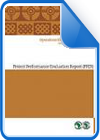Evaluation Team
This report was prepared by a team comprising Messrs. Joseph MOUANDA, Evaluation Officer and El Hassane DRAVE, Consultant, under the supervision of Mr. Mohamed H. MANAI, Manager, Project and Programme Evaluation Division, following a mission to four LCBC member countries (Chad, Cameroon, Niger and Nigeria) from 12 to 30 October 2009. Questions on this report should be referred to Mr. Mohamed M. MANAI (m.manai@afdb.org )or Mr. MOUANDA (j.mouanda@afdb.org)
Objective
The project goal was to strengthen food security in four member countries of the Lake Chad Basin area (Cameroon, Chad, Niger and Nigeria). That hinged on the reduction of pest-related crop losses, through regionally coordinated use of tested IPM techniques, notably on crops (millet and sorghum) and the acquisition by farmers of skills enabling them to adopt and apply such techniques. Through such regional level coordination, the project also aimed to contribute to regional integration
Main Lessons
- The coordination of pest control in subsistence farming by a regional structure working in collaboration with research institutes and extension services using proven research and development results constitutes an asset only when conducted with long-term perspective and after forging real ownership of the mechanism in the member countries concerned.
- There is a need to strengthen national agricultural extension and research systems through better dissemination of good practices to small producers, notably women, so as to significantly improve productivity and the food security situation which remains fragile in some Bank Regional Member Countries.
- Although costly, the Farmer Field School approach should enable the training of a larger number of village brigades and extension workers in farming and plant protection techniques.
- The establishment of a monitoring and evaluation system is essential to measure the real impact of the results of IPM techniques on yields, production costs and income beyond pilot farmers and countries
- A research and development pilot project that has achieved encouraging results and aroused genuine interest among farmers requires support measures at the end of the project, in order to preserve and consolidate project gains, and sustain its impact. 6.1.5 Although costly, the Farmer Field School approach should enable the training of a larger number of village brigades and extension workers in farming and plant protection techniques.
Main Recommendations
Recommendation(s) to the Bank:
- The Bank should engage in promoting integrated pest management (IPM) systems in regional member countries whose rural dwellers suffer enormous pest-related losses. In such cases, it should target the regions to be reached and include such activities in its rural development strategy.
- The Bank should extend the experiments and research/development to other crops, other predators and other areas of the Basin. Crops, notably food crops to be introduced, are those for which less costly IPM techniques are likely to improve yields or farmers' income, or enable a significant reduction in pesticide use, to preserve the already fragile environment of the Lake Chad Basin.
- In promoting "soft" plant protection techniques, the Bank should target areas to be promoted, so as to get a critical mass of technical capacity on IPM and progressively expand to other areas. The use of indicators to trigger transition from one phase to another, based on results, will ensure project effectiveness.
- For future integrated crop pest and disease management projects, the Bank should create synergies with other initiatives to facilitate farmers’ access to inputs and agricultural credit, promote the creation of farmer associations and support micro-credit institutions operating in the area.
- This type of research and development project must thoroughly examine the experimental protocols in terms of reducing the factors to be tested at the same time and ensuring observance of the required spacing of testing on other fields, to ensure the authenticity of results.
Recommendation(s) to the Beneficiary:
- LCBC member countries must spread IPM techniques that have received the support of farmers, since such techniques have demonstrated their technical feasibility and financial profitability. The sustainability of project impact hinges on new initiatives further involving the respective Governments, in particular national plant protection and extension services, farmer organizations and the private sector. It also hinges on extending experiments and research and development to other crops and predators.
- Member States must implement an effective integrated agricultural pest management policy by adopting appropriate laws or regulations on the use of natural products such as neem, and exploring the possibilities of large scale neem production, processing and marketing. iii. LCBC member countries should strengthen extension and plant protection activities to adapt to women's concerns, given their vital role in family holdings.
- LCBC should fully play its role as knowledge manager on the Lake Chad Basin and establish an information and data system of regional scale.
- LCBC must strengthen the Ngala Regional School to support member countries in enhancing their pest management capacity in subsistence farming. It should also ensure wide dissemination of educational materials developed by the project in order to intimate as many people as possible with integrated pest management (IPM) techniques.


